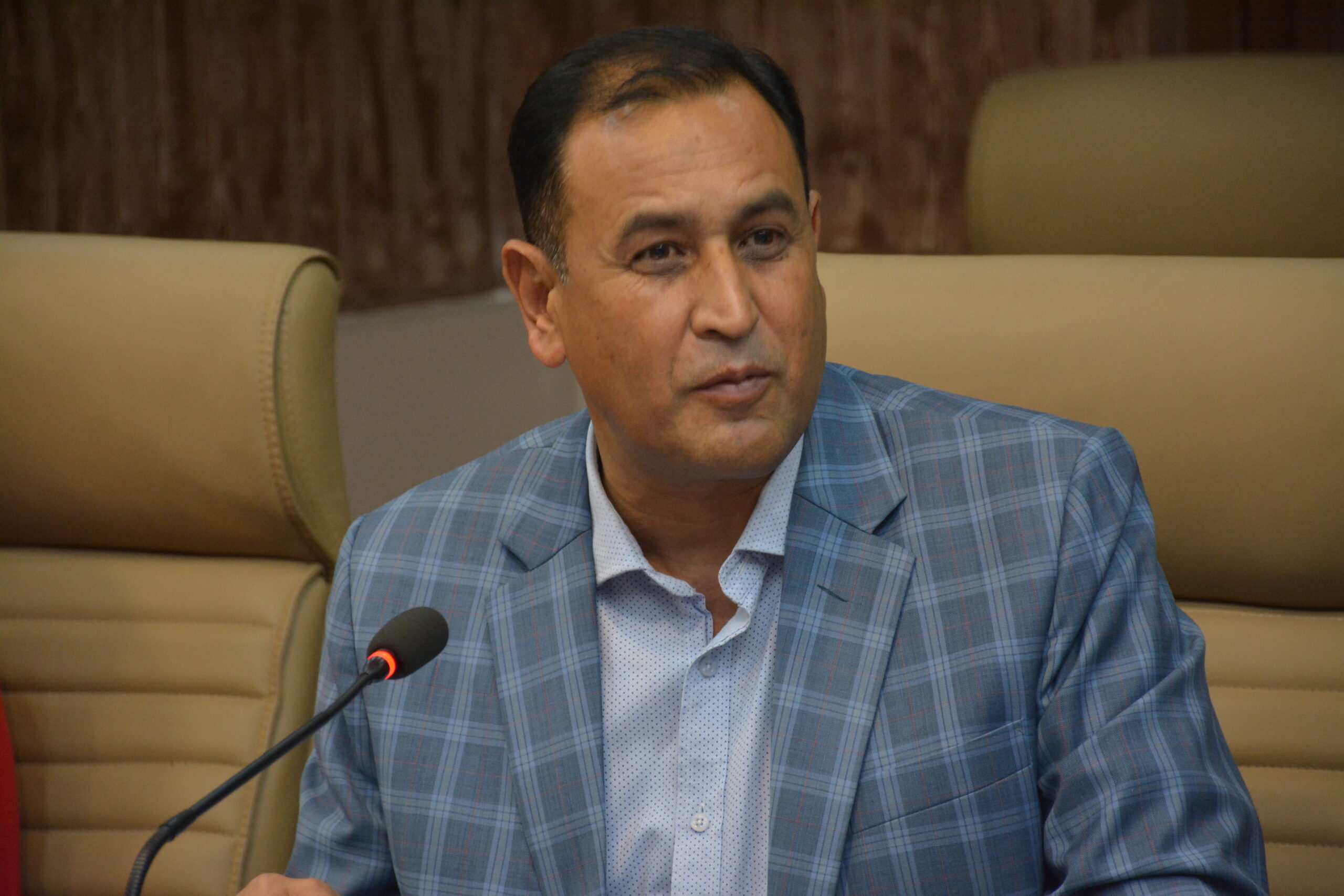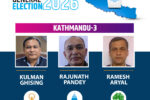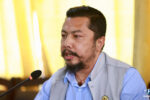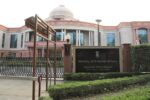KATHMANDU: Ramhari Khatiwada, a Nepali Congress MP elected to the House of Representatives from Okhaldhunga, also serves as the Chairman of the State Affairs Committee.
Khatiwada is known for his straightforwardness in Parliament and has been vocal regarding the controversies surrounding Rabi Lamichhane, the Chairman of the Rastriya Swatantra Party (RSP), who is embroiled in issues related to cooperatives and citizenship.
Lamichhane, the RSP President, has been in police custody in Kaski. Meanwhile, the RSP is staging street protests.
Khatiwada has urged the protesting RSP members to stop their demonstrations and cooperate with the investigation, emphasizing the importance of abiding by the law.
Khatiwada alleges that Lamichhane promoted the idea that “Galaxy 4K” could become Nepal’s leading television network by diverting funds from cooperatives, leading other television channels to fail.
He further claims that Lamichhane instigated the protests by encouraging two hundred “Marwaris” in Nepal to invest in the television venture and sending reporters via helicopter to cover the developments.
When asked about the government’s performance, Khatiwada acknowledges that some ministers have not met public expectations.
However, he expresses confidence that this government will operate effectively for the duration of its term, with KP Oli set to serve as Prime Minister for two years.
In a conversation with Nepali Congress MP Khatiwada regarding the GB Rai case and the government’s future:
There is an allegation that the government arrested Rabi Lamichhane, the RSP Chairman, out of political revenge. What is your take on this?
Some view it that way, but there are a couple of points to consider. We have consistently called for the formation of a commission to address the grievances of cooperative victims.
There should not be undue pressure placed on the Prime Minister. I believe the Prime Minister is not inclined to support such actions.
Now that people have taken to the streets demanding justice, it’s notable that no one raised the issue of justice for cooperative victims when we did.
Our aim has always been to uncover the truth about cooperatives, identify wrongdoers, and ensure that depositors receive their money.
We have insisted that justice should not be partisan, whether it involves Nepali Congress members, Communists, or others.
If it were purely political, Nepali Congress members like Surendra Bhandari from Gorkha would not have been arrested, nor would UML’s KP Upreti. These arrests happened after impartial evaluations.
At that time, there was no outcry; neither Nepali Congress members nor others spoke up.
Allegations of political revenge often emerge only when individuals affiliated with certain parties face consequences. We adhere strictly to the law, regardless of party affiliation or caste.
What about the questions that have arisen about Nepali Congress Vice President Dhanraj Gurung and lawmaker Rishikesh Pokhrel, Chairman of the Public Accounts Committee?
I see that the RSP has also raised this issue. The investigations concerning Dhanraj and Rishikesh are progressing.
The Nepal Police has already issued a red corner notice regarding Dhanraj’s wife, Jyoti.
If Dhanraj is involved, then his wife’s actions are also relevant. If the husband is implicated, then he should face accountability too.
The police are investigating both in light of their potential involvement. There should be no preferential treatment.
The arrests of Dhanraj and his wife should not automatically follow Rabi’s arrest; any involvement will be thoroughly investigated.
The same applies to Rishikesh. While investigations are ongoing regarding his wife, Anjana Koirala, if Rishikesh is also culpable, he must be held accountable.
No one should escape justice; if I am found guilty of any wrongdoing, I too must face the consequences.
They claim that politics is about social service but engage in fraudulent activities at the expense of depositors. This trend is unacceptable.
I do not believe that Nepali Congress or CPN-UML governments will act based on individual affiliations or party loyalties while ignoring the law. It is unjust for those who obstruct justice to evade responsibility through political connections.
RSP leaders argue that they are under attack because of Nepali Congress. You were the first to speak about Rabi in Parliament. Right?
I raised questions regarding the investigation into citizenship and passports when Lamichhane was the Home Minister.
When someone is to be arrested, proper procedures must be followed—are notices issued first, or are arrests made outright? I demanded clarification on this.
Lamichhane, during his tenure as Home Minister, often boasted about tackling crime.
Is it enough to make claims without action? Parties in the previous government stated they would address these issues, yet now they seem to allow criminals to slip through the cracks. How does that affect the investigation?
So, are you suggesting that Rabi Lamichhane helped GB Rai to flee?
That has been noted. The concept of channeling cooperative funds into television has resulted in wealth generation, causing other channels to collapse overnight.
There are 200 Marwaris in Nepal known for fraudulent activities, and it seems Rabi is the one creating the illusion that they can profit by investing in Galaxy Television.
How can one believe that GB Rai would take this money without being driven away from his partnership?
The claims I’m making have been echoed by former DIG Chabilal Joshi and others involved with GB’s cooperative who have also worked with Rabi.
He is the person who spun the dream for GB Rai, suggesting that they can succeed by channeling cooperative funds into television. This is a certainty.
How can you substantiate this?
Will the police arrest Rabi without solid evidence? How many investigations have the police conducted?
Things don’t happen without notice. Chabilal Joshi has indicated that there are others involved as well.
There are 200 Marwaris who have a significant presence in Nepal; I am familiar with them.
It appears that Rabi’s proposal was to entice them into investing and running the television network.
All of this will come to light when GB Rai comes to the fore and speaks.
Are you implying that Rabi Lamichhane was involved in preventing GB Rai’s arrest?
It’s possible that they are aware of being pursued. There is information that has surfaced; Nepal’s security agencies had knowledge of a meeting between Rabi and GB Rai during a trip to Malaysia.
Before that trip, the security agency had issued a notice regarding their meeting.
Even when he was the Home Minister, he claimed that he had approached GB Rai, and that the Nepal Police had also contacted him.
He stated that a location had been identified. Whether he drove GB away or apprehended him remains unclear.
Isn’t it the current government’s responsibility to arrest GB Rai?
Even now, GB Rai has significant investments in Nepal. It is often suggested that the savings loans will be repaid from these investments.
Whether this is true or not, if he is indeed able to help the government, he has an opportunity to improve his situation by surrendering immediately.
We believe he could play a positive role in resolving the existing confusion.
If he returns to Nepal and tells the truth, it could benefit everyone involved.
However, since GB Rai has not taken this step, the government appears to be pursuing its own investigation and arrest without public fanfare.
He should be apprehended, especially since other criminals may be trying to evade justice by using him as a shield.
There is a demand on the streets for Rabi Lamichhane to be released from custody and investigated. Shouldn’t that be addressed?
This is misguided. The arrest, made with the court’s approval, follows legal procedures, and it is not right for people to dictate what should happen from the streets. When he was Home Minister, what rules did he establish?
Some detainees are not allowed to visit the hospital, while others need a formal report to seek medical attention.
Some are barred from moving freely or speaking. When we meet with someone in person, does the Chairman of the Good Governance Committee acknowledge this? He has spoken in the House.
Can they hold a rally in support of someone who has been lawfully detained? His party does not agree with that. Is it fair to apply one set of laws when his party is in power and a different set when another party is in charge?
Now, turning to the government: there are rumors that the coalition of the Nepali Congress and CPN-UML is on the verge of collapse. Is that true? Regarding Rabi’s arrest, there seem to be two sides of the discussion within the government. What’s the reality?
This is a mere rumor. What was Rabi doing until his arrest? If his removal from power was imminent, it would have happened long ago.
The government has continued to run smoothly during this period.
This is how Prime Minister KP Oli will serve as Prime Minister for two years, after which the government will move forward with NC President Sher Bahadur Deuba taking over as Prime Minister.
There is no confusion about this. Everyone recognizes that certain working styles could be improved.
This is our government, elected by us, and we need to guide it toward stability and investment.
Our focus should be on economic progress. At this time, when the main political parties, UML and Congress, are cooperating, the Nepali people should seize this opportunity.
Since the competition is between UML and Congress, a strategic approach is necessary for effective governance.
Only then will the public regain their trust. Both parties must collaborate to eliminate flawed policies; this will halt wrongdoing and help advance Nepal’s political landscape.
There is now talk that the government may collapse due to the party split ordinance. What are your thoughts on this?
Bills are currently progressing at a good pace. The State Affairs Committee is reviewing bills related to corruption, the Commission for the Investigation of Abuse of Authority, and construction materials.
That is not the case. Some individuals may wish to split the party, but will those who seek to do so contribute positively to the country? We engage in politics for the benefit of the nation.
Can we expect meaningful change from those who seek to divide the party out of frustration over not holding ministerial positions?
Prime Minister KP Oli and Nepali Congress President Sher Bahadur Deuba both understand this.
There should not be undue pressure placed on the Prime Minister. I believe the Prime Minister is not inclined to support such actions.
There is no issue when there is a clear majority government. The ordinance is merely a rumor.
I am in ongoing discussions with the Law Minister, and the Prime Minister has not mentioned anything regarding this ordinance.
Discussions about an ordinance take place with the Law Minister. This is simply unfounded speculation.
Many people feel that the current ministers have not inspired much confidence in the government. What are your views on this?
This is a valid point. It’s true that some ministers have not met public expectations.
However, I do not wish to criticize anyone personally. We are facing significant challenges, including outbreaks of dengue, the need for flood and landslide preparedness, labor issues, tourism difficulties, and problems in the energy sector.
Ministers need to perform better. If they fulfill their responsibilities as expected, it will ultimately benefit the Nepalese people.
I am not singling anyone out; we support creating an environment where current ministers can work more transparently and honestly for the public good. Ministers should be proactive and prioritize the country’s interests over their own.
With that in mind, are there rumors about potential ministerial changes?
While changes may not be immediate, if ministers fail to perform and this becomes a significant concern among citizens, then changes will occur. Why should anyone remain in a position if they are unable to fulfill their duties?
There is no party change happening now, but if ministers cannot deliver results and dissatisfaction grows, changes will be necessary. However, that time has not yet arrived.
Finally, there are complaints that the government has not been able to advance important bills in a timely manner. What do you say about this as a legislator?
Bills are currently progressing at a good pace. The State Affairs Committee is reviewing bills related to corruption, the Commission for the Investigation of Abuse of Authority, and construction materials.
The construction materials bill, in particular, has sparked some controversy, with around 400 amendments proposed.
The Civil Bill also has approximately 1,500 amendments from 153 MPs. After Tihar, we aim to finalize these laws.
We will submit two bills soon, and all state-related bills will reach Parliament in the next session.
Occasionally, quorum issues have caused delays, but now we are operating continuously.









Comment